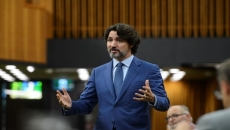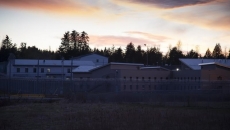The Supreme Court of Canada will not hear a new appeal from British Columbia First Nations over the Trans Mountain pipeline expansion.
The court on Thursday dismissed the appeal from the Squamish Nation, Tsleil-Waututh Nation, the Ts’elxwéyeqw Tribes and Coldwater Indian Band, effectively ending the years-long legal battle over the project.
As is customary, the court did not give reasons for its decision.
First Nations leaders planned a news conference later in the day to respond to the court's decision.
Natural Resources Minister Seamus O'Regan said the government had worked hard to hear and accommodate concerns the communities have with the project and welcomed the court's decision.
"The government approved TMX because it is an important project for Canada," he said in a statement.
"Construction of TMX is underway and has already created more than 4,900 good, well-paying jobs, will help us gain access to new markets for our resources and generate revenue to help fund clean energy and climate change solutions."
He acknowledged there are people who will be disappointed with dismissal and said the government will continue to engage with them about the project "in the spirit of partnership, to make sure we get this right."
The Trans Mountain project was first approved in 2016, but stopped by the Federal Court of Appeal two years later after First Nations and environmental groups successfully argued the approval process was flawed.
Ottawa approved the project a second time in June 2019 after additional consultation with the affected communities. The bands still felt the government did not fulfil its duty to consult and again appealed the decision.
The Federal Court of Appeal ruled in February the approval would stand, saying the government made a genuine effort to hear and accommodate concerns raised. The First Nations disagreed and asked the Supreme Court to hear the case.
The bands still have outstanding concerns about the impact the pipeline could have on drinking water and marine life — particularly the highly endangered Southern Resident killer whales — off the B.C. coast.
Thursday's decision would appear to be the end of the road for legal arguments aimed at stopping construction on the pipeline.
In January, the Supreme Court said the B.C. government had no authority to try and regulate what could flow through the pipeline, which as an interprovincial project sits in federal jurisdiction.
The court also declined in March to hear a challenge from environmental groups who had been denied the right to appeal the second approval.
The expanded pipeline will nearly triple the amount of diluted bitumen flowing between Alberta's oilsands and a marine port in Burnaby, B.C.
Initially proposed by Kinder Morgan Canada to twin the existing pipeline that carries both refined products and diluted bitumen, the pipeline became a political symbol for the fight over whether Canada can continue to extract and sell fossil fuels and combat climate change.
In 2018, the company's shareholders got cold feet about proceeding with the multibillion-dollar expansion, worried that legal challenges from Indigenous communities, environment groups and the B.C. government would delay construction too long.
The federal Liberal government was unable to convince the company it could overcome the legal hurdles, and in May 2018 bought the existing pipeline for $4.4 billion with a promise to get the expansion done and then sell everything back to the private sector.
That decision was dealt a significant blow just months later when the Federal Court of Appeal overturned the approval, halting construction. Building began anew last summer after the second approval, and continued despite the new legal challenges.
Prime Minister Justin Trudeau has consistently tried to sell the project as his government's compromise between the economy and environment, arguing Canada can only pay for the transition to a cleaner, greener future if it takes advantage of its natural resources, which remain in demand around the world.
Most oil produced in Alberta is sold at a discount because Canada is so heavily reliant on the United States as its customer. The hope is that this pipeline will carry more Canadian oil to the Pacific, where it can make its way to Asia and raise the price companies can get for oil.






